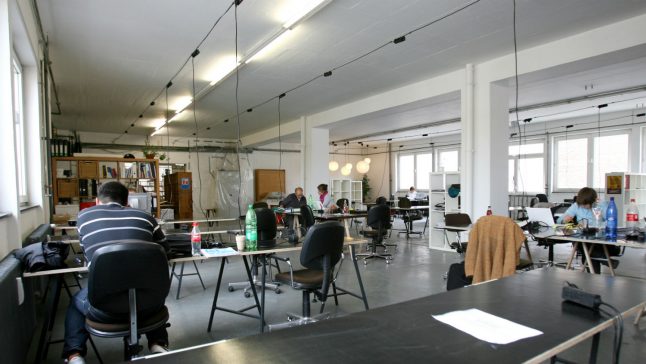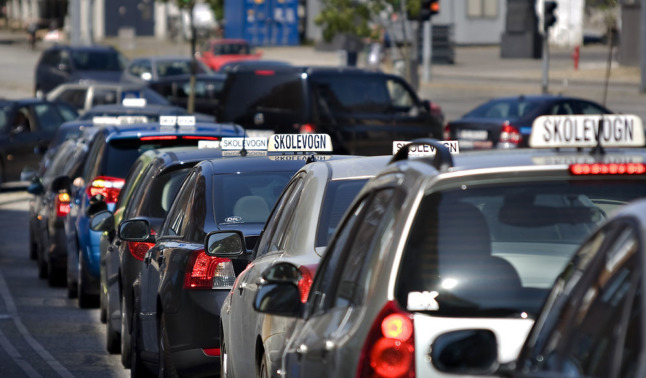While living costs continue to climb higher in the German capital, there are still a slew of shared working spaces which offer affordable monthly spots – for as little as 50 euros a month for unlimited access in central areas.
Berlin boasts over 100 co-working spaces, most which have sprung up within the last decade, and many within the last year. Often set up in former factories, industrial hubs and even an old parish house, these spaces are like large living rooms which encourage productivity with the aid of fast WiFi, lively networking events and ubiquitous coffee.
We look at some of the coolest, most creative and cheapest spots to plant your laptop in Berlin, whether you’re seeking out space for your whole company, or are a freelancer looking for a more inspiring atmosphere than your flat.
1) The Factory
Built into a former factory that used to divide east and west Berlin, the Factory is now one of Berlin’s hippest start-up spots. You’ll even have to undergo an informal group interview before being approved for a monthly pass, but once you snag a spot you’ll only be paying 50 euros a month for a nonstop stream of networking events, business consultations, yoga classes and, oh yeah, desk space at any available place. There are now partner spaces throughout Berlin, including a new location in Görlitzer Park.
Hours: They offer generous hours between 8 am and 9 pm.
Costs: A monthly pass for all members will only set you back €50 per month.
A post shared by Unicorn.Berlin (@unicorn.berlin) on Aug 18, 2018 at 4:56am PDT
Nearby the Factory sit not just one but two locations of The Unicorn, which just opened two additional locations further south in Berlin. All four branches boast fast wi-fi, healthy catered food and unlimited free coffee, including cappuccinos. During the day, both locations are usually hush-quiet save for the occasional business call, but come 5:30 pm, they offer many events, including language exchanges and a monthly breakfast with fellow co-workers.
Hours: They stick by standard hours of 9 am to 6 pm.
Costs: If you purchase online, you can receive a monthly pass for only €69 per month.
A post shared by coworking space | berlin (@tuesdaycoworking) on Aug 13, 2018 at 3:56am PDT
Tucked away from Berlin’s beaten start-up path, these two homey spaces in Schöneberg – just a five minute walk from one another – are perfect spots for casual co-workers. That’s both due to their laid back ambience and the fact that it offers passes for just 20 hours a week. Winner of the 2018 Coworkers’ Choice Award for Berlin, the space also offers unlimited access after-hours.
Hours: 9 am to 6 pm.
Costs: Tuesday offers a 20-hour “flex 50” pass for €85 a month (a full-time pass is twice the cost). All members, however, receive unlimited access during non-business hours, and access to both spaces.
4) Betahaus
A post shared by betahaus | Berlin (@betahaus) on Aug 20, 2018 at 9:00am PDT
Whether hosting a meetup about bitcoin or a start-up pitching session, this joint co-working space and event hub is undoubtedly a fun place to set up shop. Open since 2009 and now home to over 500 start-ups, it’s arguably Berlin’s biggest co-working endeavour. Digital nomads, take note: A basic membership even grants so-called “global access” to any of Betahaus’ partner offices, with locations ranging from Barcelona to Bogota.
Hours: A basic “club membership” grants access during business hours, or 9 am to 8 pm, the same hours which Betahaus’ public cafe is open. A “professional membership” grants access all of the time.
Costs: A basic full-time membership will only set you back €100 a month, although private office spaces go for at least double that amount.
5) FIREWORKS
A rare hip neighbourhood with affordable rents, Wedding has turned into a hub for freelancers, artists and all sorts of entrepreneurial types. Located in a the rear building of a former fire station, this shared office space is full of lights, plants and enthusiastic co-workers who range from programmers to phD researchers.
Hours: 24/7 access for members
Costs: A very fair-priced fixed desk will set you back between €130 and €160 a month.
6) Ahoy Berlin!
Situated in leafy Charlottenburg, this is one of the furthest west co-working spaces around. Luckily it’s price tag doesn’t match the prime real estate value of the neighborhood. Want to check them out, commitment-free? (It is Berlin, after all!) Every month the space hosts a Freelance Friday, where a knowledgeable speaker from the start-up world gives an afternoon talk, followed by the chance to network – or plant your laptop quietly in the corner for a few hours.
Hours: Standard hours are 9 am to 6 pm.
Costs: A monthly ticket will run you €150 euros per month, and you can tack on an additional €30 for unlimited access.
7) Space Shack
This artsy space offers a diverse array of desk setups, including an “anti-desk”, or space where you can hang out anytime, without the typical amenities. One of the most creative pricing schemes in Berlin, you can save big here if you stick to non-traditional hours or are satisfied staking a spot in the communal working space.
Hours: Normal business hours are 6 am to 9 pm.
Costs: For night owls (or super early birds), Space Shack offers a deal for €90 a month for unlimited access outside of business hours. If working on a beanbag chair is your thing, you can also pay €60 per month for an “anti-desk”. Normal 24/7 access, desk included, costs upwards of €160 per month.
8) Colonia Nova
A post shared by Colonia Nova (@colonianova.berlin) on Jul 10, 2018 at 4:22am PDT
With 16 airy sunlight studios and a rooftop terrace overlooking Neukölln near Sonnenallee, this is the quintessentially creative hub hosting a friendly team of screenwriters, filmmakers and graduate students, not to mention the occasional canine co-worker as well. All are quiet, usually including the office dog, so it’s a great space to buckle down and finally churn out that piece of writing.
Hours: Creative time never stops here, with 24/7 membership for all members.
Costs: Rent is a flat 150€/month and includes a dedicated desk, wifi, regular cleaning, use of printer, and 24/7 access.
9) Lighthaus
A post shared by lighthaus.berlin (@lighthaus.berlin) on Aug 2, 2018 at 3:26am PDT
Originally founded as Berlin’s first cinematic co-working space, this homey studio has since evolved to a shared office for any creative endeavor where members, starting from just 50 euros per month, have access to everything from desk space to boxing lessons.
Hours: An ideal space for later workers, they are open from 10 am to 10 pm.
Costs: Basic memberships run from €50 to €100 per month, but you can also pay €190 for a fixed desk with a business address.
10) Launch/CO
In Berlin, it’s the norm to convert unconventional spaces into working hubs, and Launch/CO – set up in the parish house of an old church – is no exception. It still comes equipped with standard business amenities and flexible plans for every schedule.
Hours: Standard hours of 9 am to 6 pm.
Costs: Located right off Warschauer Strasse, a desk at this hip studio goes for a bit more than others on the list: starting at €150 euros per month for part time, the price of admission also includes a selection of snacks and drinks and a rooftop terrace.



 Please whitelist us to continue reading.
Please whitelist us to continue reading.
Member comments